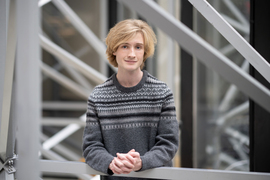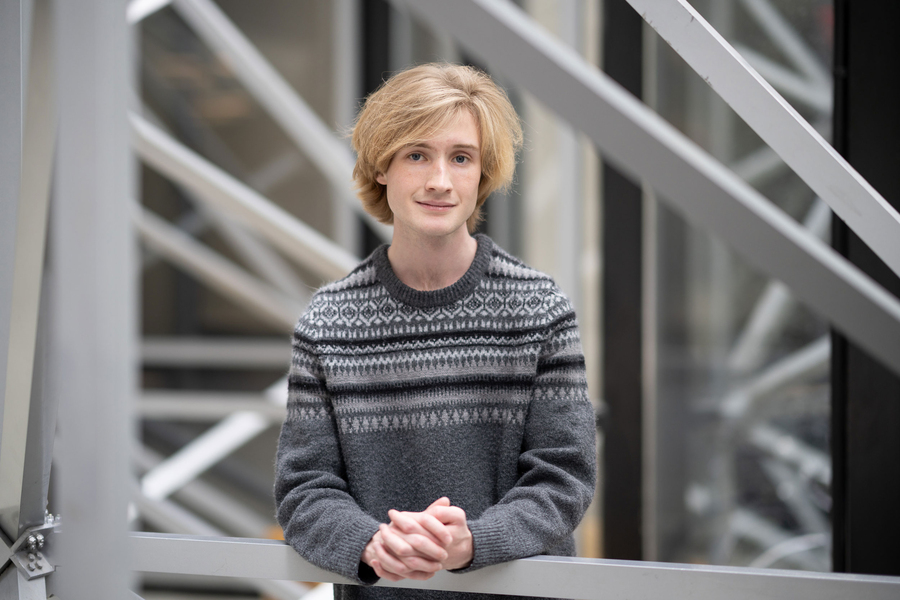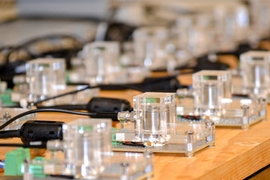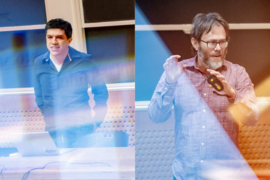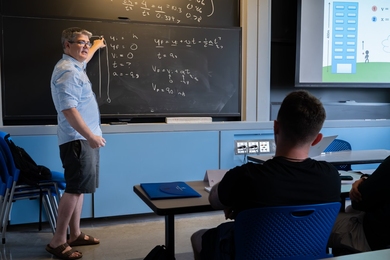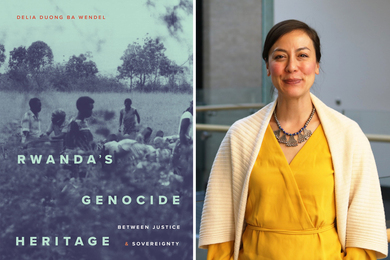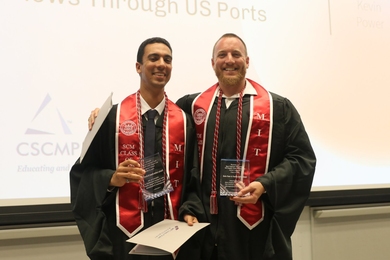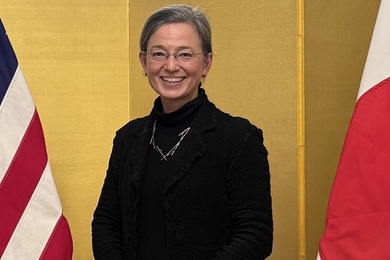Audio
Coming from a small high school in rural South Dakota that didn’t offer advanced placement (AP) classes, Titus Roesler ’25 didn’t have the easiest start at MIT. But when his efforts to catch up academically to his peers led to a job as a teaching assistant, it changed everything.
Roesler, who graduated last spring with a bachelor’s degree in electrical engineering and is now working on a master’s, has built a reputation for himself as a student-teacher at MIT. Since discovering his affinity for teaching and mentoring, he’s been a teaching assistant for four different classes and designed two seminars from scratch.
Through teaching, Roesler has not only helped other students, but also improved his own grasp of complex subjects. That includes signal processing, which involves manipulating signals, such as radio waves, to make them more useful for applications like wireless communications. He has become fascinated by the topic and hopes to continue working in the field.
Roesler lights up when talking about teaching, but he didn’t always think it was in the cards.
“I don't know that anyone who knew me pre-MIT would believe that I do things like give recitations to crowded rooms, because I think everyone thought, ‘Titus is that quiet kid, he never talked at all.’”
Learning through teaching
Growing up in Marion, South Dakota, a town with a population around 800, Roesler didn’t have MIT on his radar, but he knew he liked math. His high school capstone project involved helping his classmates on the math section of the ACT, and he tutored a few of his classmates. His teacher let him teach trigonometry one day, and he toured local colleges with the plan of becoming a high school math teacher.
But that changed after he self-studied calculus through MIT’s OpenCourseWare offerings and set his sights on the Institute.
Roesler worked overtime during his first year at MIT to catch up with what his peers had learned back in high school. On his first physics exam, he answered only one question correctly — a multiple-choice question he had guessed on. But MIT’s Experimental Study Group (ESG) kept him afloat during his first year, and it quickly led to more opportunities.
When, in the spring of his first year, his multivariable calculus instructor asked him to stay after class one day, Roesler was sure he was in trouble. She actually wanted to see if he could TA for her next year.
“I was flattered because there was still a month left in the class. Plenty of time for me to fail,” Roesler jokes.
He loved the job. During a Friday night office hour session, he stayed for extra hours to help a student whom he saw a lot of himself in — someone who was also from a rural background and had also entered MIT without a strong mathematics background. He went on to become the student’s tutor. The position gave him the opportunity to be the teacher he’d always wanted to have.
As a TA, “I wasn't coming at things from the perspective of ‘Everyone already knows A, B, C’ before I explained. I would always try to start from the ground up and give my perspective on it,” Roesler says.
From his mentorship and teaching work, he received the Undergraduate Teaching Award from the Department of Electrical Engineering and Computer Science and the Outstanding Associate Advisor Award from the Office of the First Year. After joining ESG during his first year, Roesler stayed on as an associate advisor in the learning community for the next three years. His work earned him the Fiekowsky Award for Excellence in Teaching and the Fiekowsky Award for Community Service.
The right blend
Signal processing, the focus of his graduate work, “is where calculus, geometry, linear algebra, probability, statistics, algorithms, and numerical analysis all come into play on practical problems of real-world interest,” Roesler says. “For me, it’s the right blend of theory and application.”
Due to the field’s wide scope, Roesler notices potential applications for signal processing everywhere, and how different fields intersect within the discipline. “Everything comes together in just the right way,” he says.
He is especially interested in signal-processing problems such as source separation, which aims to recover a set of source signals from a set of mixed signals. During his senior year, he spent two semesters on a project where he wrote a Python program to separate harmonies in Bach chorales.
For his master’s degree, following a summer research internship at MIT Lincoln Laboratory, Roesler has stayed at the laboratory, this time venturing into high-frequency radio communications. He’s currently working on a research project that applies the theory of compressed sensing (which states that, under certain conditions, it is possible to reconstruct signals from very few measurements) to communications.
What fascinates Roesler are “something-from-nothing” problems.
“The kind of problems I’m interested in are underdetermined, inverse problems,” he says. For example, imagine trying to reconstruct a full image from only a handful of pixels. While on the surface this seems impossible, researchers have recovered quality images by applying the techniques of compressed sensing.
Running and serving
Roesler has also spent extensive time running, a sport he’s loved since fifth grade. In 2023, he raced a marathon in 2 hours and 46 minutes and went on to run the Boston Marathon in both 2024 and 2025. To prepare, he spent a lot of time reading up on the psychology of running, which he says was the first time he used the scientific method. Now, he just runs for fun and uses it as a way to focus and collect this thoughts.
He has also served on the executive team of the Undergraduate Mathematics Association, as a resident peer mentor at Baker House, and a tutor for two classes. At the PKG Center, he’s been a program lead and counselor for its pre-orientation program.
Roesler still gets excited about seeing the impact of his teaching. At the end of one semester teaching a tutorial, he took his class on a picnic. They surprised him with a card and a bag of goodies.
Recalling the moment, he says: “I thought, How does it get better? It was wonderful.”
